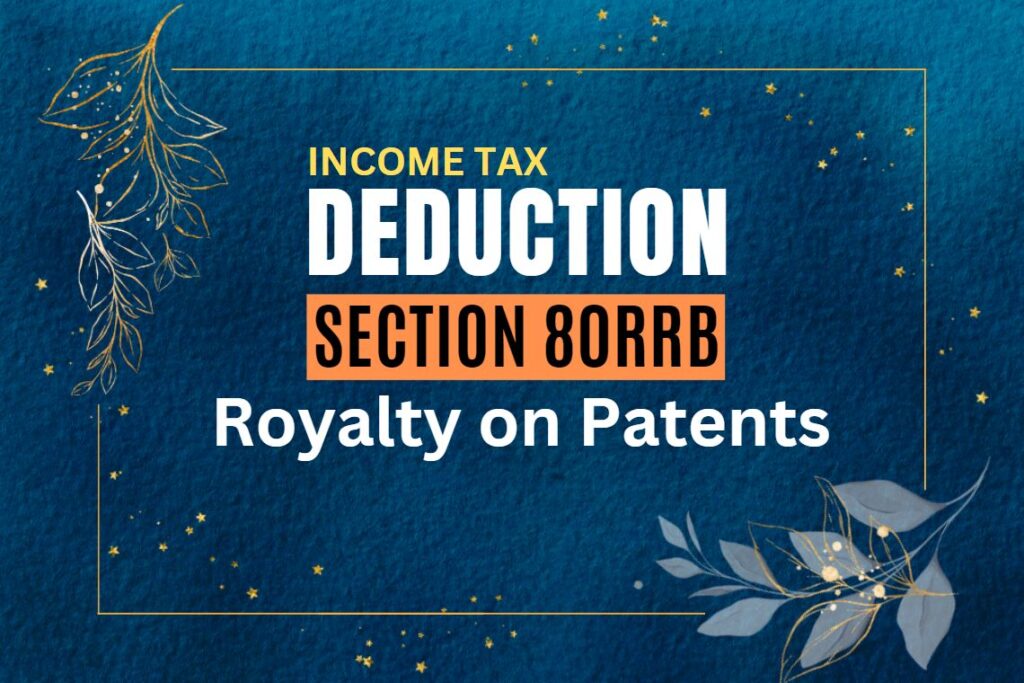1. Understanding of Section 80-IAC
The Income Tax Act, 1961 provides various deductions for taxpayers to reduce their taxable income. One such deduction is Section 80-IAC, which is specifically designed to encourage the growth of eligible businesses and startups in India. In this blog post, we will explore the details of Section 80-IAC and how it can benefit eligible businesses and startups.
The provisions of Section 80IAC towards Deduction in respect of Eligible Business or Eligible Start Up with following conditions are given below –
Eligibility Criteria –
The following conditions should be satisfied –
- The assessee is a company or a limited liability partnership (LLP) and engaged in an eligible business (“eligible business” means a business carried out by an eligible start up engaged in innovation, development or improvement of products or processes or services or a scalable business model with a high potential of employment generation or wealth creation).
- The above company or LLP is incorporated after March 31, 2016 but before April 1, 2021.
- Annual business turnover of the company or LLP does not exceed Rs. 25 crore in the previous year relevant to the assessment year for which deduction is claimed under section 80-IAC.
- It holds a certificate of eligible business from the Inter-Ministerial Board of Certification as notified in the Official Gazette by the Central Government.
- The above company or LLP is not formed by splitting up, or the reconstruction, of a business already in existence. However, this condition is not applicable in respect of a start-up which is formed as a result of the reestablishment, reconstruction or revival by the assessee of the business of any such undertaking as referred to in section 33B.
- It is not formed by the transfer to a new business of machinery or plant previously used for any purpose [it is subject to a few exception].
- Eligible startups must be recognized by the Department of Industrial Policy and Promotion (DIPP), Ministry of Commerce and Industry, Government of India. DIPP recognition is based on specific criteria related to innovation and job creation.
Deduction Amount
The deduction under Section 80-IAC is available for three consecutive assessment years, starting from the year in which the eligible business or startup commences its operations. The deduction amount is:
- 100% of the profits and gains derived from the eligible business or startup for the first three assessment years.
- 50% of the profits and gains derived from the eligible business or startup for the next two assessment years.
Application Procedure
To claim the deduction under Section 80-IAC, eligible businesses and startups need to follow these steps:
- File the income tax return for the relevant assessment year.
- Calculate the taxable income after considering all other deductions and exemptions.
- Claim the deduction under Section 80-IAC by filling the necessary details in the income tax return form.
- Submit the income tax return form along with the required supporting documents to the Income Tax Department.
Deduction Not to be Allowed in cases where Return is not Filed within the Specified Time limit [Section 80AC]:
Under Section 80AC, if an Assessee is eligible for any deduction or exemption under the Act, the benefit can only be claimed if the income tax return is filed on or before the specified due date. This provision ensures that taxpayers fulfill their filing obligations in a timely manner in order to avail the tax benefits they are entitled to.
2. [Section 80-IAC(1)]: 100% Deduction of Profit from Eligible Business
Section 80-IAC(1) of the Income Tax Act, 1961 allows for a 100% deduction of profit from eligible businesses. This section was introduced to promote and encourage startups in India. In this blog post, we will explore the details of this section and understand how it can benefit startups.
Eligibility Criteria
To avail the benefits under Section 80-IAC(1), a startup needs to meet certain eligibility criteria:
- The startup should be incorporated as a private limited company or a limited liability partnership (LLP) after April 1, 2016, but before April 1, 2021.
- The turnover of the startup should not exceed Rs. 25 crores in any of the previous financial years.
- The startup should be engaged in innovation, development, deployment, or commercialization of new products, processes, or services driven by technology or intellectual property.
Duration of Deduction
The deduction under Section 80-IAC(1) can be claimed for 3 consecutive assessment years out of the first 10 years since incorporation. This means that a startup can enjoy the benefits of this section for a maximum of 3 years.
Calculation of Deduction
Once a startup fulfills the eligibility criteria and is within the duration of deduction, the deduction amount can be calculated as follows:
- The eligible startup can claim a deduction of 100% of the profits and gains derived from the eligible business.
- The deduction is available only on the profits and gains derived from the eligible business and not on any other income or losses.
- The deduction amount is to be calculated before any other deductions such as depreciation, brought forward losses, etc.
Advantages of Section 80-IAC(1)
Section 80-IAC(1) provides several advantages for startups:
- It helps in reducing the tax liability of startups by allowing a deduction of 100% of the profits and gains.
- The deduction can be claimed for 3 consecutive assessment years, providing stability and support to startups during the initial years.
- It encourages innovation and technological development by incentivizing startups engaged in such activities.
3. [Section 80-IAC(2)]: Deduction to be Allowed for any 3 Consecutive Assessment years out of 10 years
Section 80-IAC(2) of the Income Tax Act, 1961 provides a significant deduction for eligible startups. According to this provision, startups can claim a deduction for any three consecutive assessment years out of ten years. This deduction is aimed at promoting and supporting innovation and entrepreneurship in India.
The deduction allowed under Section 80-IAC(2) applies to eligible startups that have obtained a certification from the Inter-Ministerial Board of Certification. This certification is granted to startups that meet certain criteria related to innovation, scalability, and potential for employment generation.
Once a startup has obtained the certification, it becomes eligible to claim a deduction of 100% of its profits and gains for any three consecutive assessment years out of ten years. This deduction can be a significant boost for startups, as it allows them to retain a larger portion of their earnings and reinvest it into their business.
Conditions for Availing the Deduction
While the deduction is beneficial for startups, there are certain conditions that must be met in order to avail it. These conditions include:
- The startup must be incorporated as a private limited company
- It must be engaged in innovation, development, deployment, or commercialization of new products, processes, or services driven by technology or intellectual property
- The turnover of the startup must not exceed INR 25 crore in any previous year
- The startup must not have been formed by splitting up, or reconstruction, of a business already in existence
4. [Section 80- IAC(3)]: Conditions to be satisfied to Claim Exemption under section 80-IAC(1)
This section applies to a start-up which fulfils the following conditions, namely:—
(i) it is not formed by splitting up, or the reconstruction, of a business already in existence:
Provided that this condition shall not apply in respect of a start-up which is formed as a result of the re-establishment, reconstruction or revival by the assessee of the business of any such undertaking as referred to in section 33B, in the circumstances and within the period specified in that section;
(ii) it is not formed by the transfer to a new business of machinery or plant previously used for any purpose.
| Explanation 1.—For the purposes of clause (ii) above, any machinery or plant which was used outside india by any person other than the assessee shall not be regarded as machinery or plant previously used for any purpose, if all the following conditions are fulfilled, namely:—
(a) such machinery or plant was not, at any time previous to the date of the installation by the assessee, used in India; (b) such machinery or plant is imported into India; (c) no deduction on account of depreciation in respect of such machinery or plant has been allowed or is allowable under the provisions of this Act in computing the total income of any person for any period prior to the date of the installation of the machinery or plant by the assessee Explanation 2.—Where in the case of a start-up, any machinery or plant or any part thereof previously used for any purpose is transferred to a new business and the total value of the machinery or plant or part so transferred does not exceed 20% of the total value of the machinery or plant used in the business, then, for the purposes of clause (ii) of this sub-section, the condition specified therein shall be deemed to have been complied with. |
5. [Section 80-IAC(4)]: Further Conditions applicable for an Assessee Claiming Deduction under Section 80-IAC
The provisions contained in section 80-IA(5) and 80-IA(7) to (12) shall, so far as may be, apply to the eligible business under this section. These provisions relate to the following:—
(i) Computation of profits of eligible business [Section 80-IA(5)]
(ii) Audit of accounts [Section 80-IA(7)]
(iii) Inter-unit transfer of goods [Section 80-IA(8)]
(iv) Restriction on double deduction [Section 80-IA(9)]
(v) Restriction on excessive profits [Section 80-IA( 10)]
(vi) Power of Central Government to notify undertakings to which section 80-lB will not apply [Section 80-IA(11)]
| Explanation.—For the purposes of this section,—
(i) “eligible business” means a business carried out by an eligible start up engaged in innovation, development or improvement of products or processes or services or a scalable business model with a high potential of employment generation or wealth creation; (ii) Meaning of “eligible start up” “Eligible start-up” means a company or a limited liability partnership engaged in eligible business which fulfils the following conditions, namely:— (a) it is incorporated on or after the 1 st day of April, 2016 but before the 1 St day of April, 2022; [Extended upto 1-4-2023 by the Finance Bill, 2022] (b) the total turnover of its business does not exceed 100 crore in any of the previous year relevant to the assessment year for which deduction under sub-section (1) is claimed; and (c) it holds a certificate of eligible business from the Inter-Ministerial Board of Certification as notified in the Official Gazette by the Central Government. Note.—Since eligible company also means “eligible start up”. Investment in LLPs shall also be eligible for exemption under section 80GB provided it carries on an eligible business. (iii) “limited liability partnership” means a partnership referred to in section 2(l)(n) of the Limited Liability Partnership Act, 2008 |












